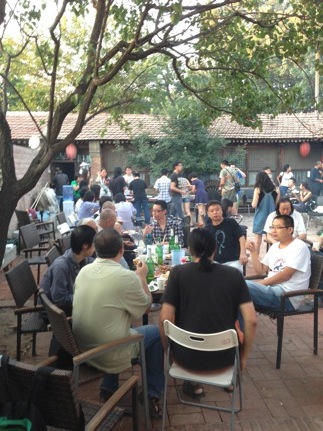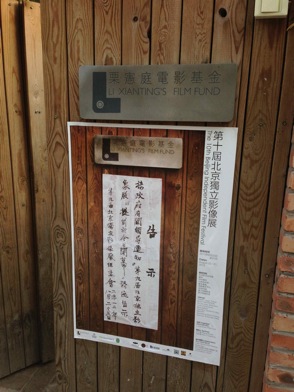In an interesting turn of events, the Beijing Independent Film Festival concluded on Saturday without further interference from local authorities. Despite opening-day warnings that suggested cancellation was a distinct possibility, the festival continued to screen films every day at the Li Xianting Film Fund’s office courtyard in Songzhuang Art District.
When I visited on Saturday, I expected to find a closed-off screening area. Instead, I saw things operating normally, albeit quietly.
Inside the hutong’s courtyard, two converted theaters screened the festival’s full-length and short films to a small but dedicated audience. A courtyard adjoined the two theaters, where fans and Li Xianting Film Fund organizers engaged in relaxed conversation. Nearby, a number of books were available for sale. On the second floor, a small but hard-working crew with MacBooks ensured things ran smoothly.
Here’s one of the screening rooms being prepared for closing remarks:

The general mood was upbeat. The festival had been running for nine straight days with nary a hitch, police visit or arrest. During the closing on Saturday, organizers celebrated by hosting a barbecue in the courtyard:

This was a far cry from the scene on August 23, when TimeOut Beijing reported that the festival had been “cancelled by the powers that be. Well, kind of.”
Immediately after the opening ceremony in a Songzhuang cafe-cinema, which was attended by directors from as far afield as Iran and Sweden, the assembled crowd were informed that the planned screenings would not be taking place as scheduled.
Hours later, festival director Wang Hongwei (who you may have seen in Jia Zhangke films) emerged to announce that the festival would proceed, only with certain concessions. “Not in a way actually recognisable as a festival,” according to TimeOut.
Approved persons – directors, jury, invited guests – can sign up to take away DVDs of all the films that were to be screened at the fest, to watch in their own time. They can then return to Songzhuang to take part in the already scheduled discussions and lectures. However, the DVDs may not be watched by fewer than two people or more than five. The movies can also be watched on individual computers at the Li Xianting Film Foundation (presumably while a staff member hovers in the background, meeting the ‘minimum two people’ quota).
Organizers informed Jing Daily that “sources at BIFF said that the afternoon’s opening ceremony was able to proceed, but they were not allowed to screen films” that day.
So why didn’t authorities scrap the entire festival? There were two popular theories from those in attendance.
One theory is that authorities were internally divided on the severity of enforcement. As one organizer explained to me, there is unlikely to be consensus between internal groups in the cultural and propaganda ministries. Quite possibly, one group made the opening day announcement, only to have that decision overruled by another group. This year’s leadership changes can also result in mixed messages. It’s difficult to predict what precedent will apply, even compared to last year.
The other theory is that authorities did not want to generate further unwanted publicity and attention. The festival’s location in Beijing was a double-edged sword for everyone — the city is a cultural nexus, perfect for film festivals, but also a political hub, making it difficult to accept some of the controversial subjects tackled in independent film.
I managed to catch up with Wang Hongwei, the lead organizer. He was reluctant to discuss plans for next year, citing concerns that it would raise unwanted attention. Organizers are careful not to say or do too much, creating an interesting balancing act for themselves when it comes to marketing the event.
Wang explained that the festival was an important platform for artistic self-expression. This mission and clarity of purpose is what has kept him personally involved since 2008.
He implied that the festival would show no signs of stopping in the future.
“Chinese independent cinema has developed remarkably,” he said. “We look forward to the future, even though in the short term we are not yet on par with the international community.”
In other words, reports of Chinese independent cinema’s demise may be premature.
Follow James Hsu on Twitter @james_hsu and Sina Weibo.

















































